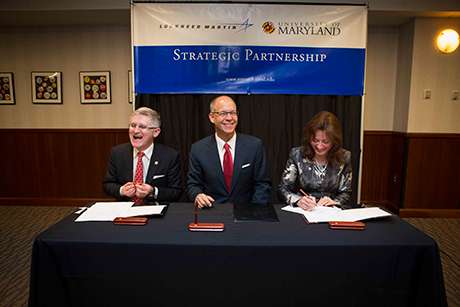Lockheed Martin, University of Maryland to develop next generation quantum computer

Lockheed Martin and the University of Maryland are partnering to develop an integrated quantum computing platform that has the potential to enhance fields ranging from drug discovery and communications to logistics.
The parties signed a memorandum of understanding today establishing the Quantum Engineering Center at the University of Maryland, College Park.
"Classical computing can only take us so far," said Dr. Ray O. Johnson, Lockheed Martin senior vice president and chief technology officer. "In the future, critical systems will become so complex that problems will take too long or become too expensive to solve using even our most powerful supercomputers. We believe the next computational revolution will stem from applied quantum science—a discipline that connects physics, information science, and engineering."
Building on more than 60 years of collaboration, Lockheed Martin and the University of Maryland signed a formal strategic framework in 2010 to jointly pursue research and development projects and business opportunities. The Quantum Engineering Center is the most recent opportunity to push the boundaries of scientific discovery and innovation.
"By building on our world-class research expertise, the University of Maryland will transform the study of quantum mechanics into the practice of quantum engineering through this unique partnership with Lockheed Martin," said Dr. Mary Ann Rankin, senior vice president and provost of the University of Maryland, College Park. "Together, we will bring multidisciplinary methods to an area that has the potential to transform the lives of citizens around the globe."
The initial goal of the Quantum Engineering Center is to demonstrate a quantum platform that features reliable, well-characterized operation without requiring a user to have a deep understanding of the internal workings of the system—just like conventional computers work today. To achieve this will require close cooperation between scientists and engineers.
"In the case of quantum components, it's like we're back in 1947 working with the first semiconductor transistors," said Dr. Chris Monroe, Bice Zorn professor of physics at the University of Maryland. "We are talking about unusual systems— specially tuned laser and microwave fields trained with exquisite precision onto individual atoms suspended with electrical fields and immersed in a vacuum chamber a million times less dense than outer space. Each aspect is challenging in its own way, but we understand exactly how every piece works. Our focus now is integrating these systems to consistently and reliably work in harmony, much like engineering a complex aircraft, so that the device is more than just a sum of its parts."
Provided by Lockheed Martin